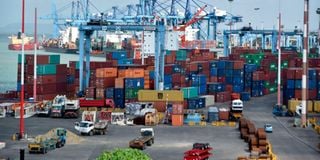Privatisation is killing KPA softly

Kenya Ports Authority (KPA) Yard in Mombasa.
As a veteran journalist, I have reported and commented on the policy of privatisation since we rolled out our very first program in 1992 under Mr George Mitine and John Simba. I can smell mischief from a mile away.
Why is the government so much in a hurry to transfer ownership and control of the most profitable part of Kenya Ports Authority (KPA) business to an entity that is effectively under the control of the Mediterranean Shipping Company (MSC)?
Where is due process in this transaction? When you are transferring ownership and control of a public assets through a concession, you must do so transparently through a competitive procurement process.
Details and terms such as concession fees, tenor, service level agreements, investment benchmarks, throughput fees, and sanctions for default on performance, must be publicly disclosed.
But first, the news. The board of the KPA convened in Mombasa last week at which they were expected to implement a government order requiring them to make a resolution approving the transfer of control of the second container terminal to the Kenya National Shipping Line.
While the government owns a majority stake of 53 per cent and MSC, 47 per cent – effective control of the company is in the hands of MSC through management agreements. From what I gather, these four-month-old board members resisted passing the resolution after the management of KPA presented a paper questioning the legality of the proposed privatisation.
An amendment
On Thursday last week, the board was hurriedly called back from Mombasa and directed to attend an urgent meeting at the National Treasury headquarters where they were read the riot act and ordered to sign the resolution immediately.
Section 16(1) of the Merchant Shipping Act of 2009 says this : “No owner of a ship or person providing the services of a shipping line shall either directly or indirectly provide in the maritime industry crewing services, pilotage ,port facility operator, quay side service provider, terminal operator, general ship contractor...” Put plainly, the law does not allow a shipping line to operate a port.
Has the law been broken? That is not for me to say as I have no claim to domain knowledge of the law.
All I can do is to give you a bit of background to an intriguing and convoluted legal saga surrounding this controversy.
In 2011, shipping lines went to court to challenge the constitutionality of Section 16(1) of the constitutionality of Merchant Shipping Act. The issue dragged in court until last year when the Attorney-General entered a consent with the parties agreeing that the section was unconstitutional.
It would appear that in the middle of the saga, the government successfully pushed through an amendment by introducing Section 16 (1A), saying that Section 16(1) shall not apply to a shipping line wholly owned by the government’.
The Dockworkers Union went to court to challenge Section 16(1A) and a three-judge bench — Justices Erick Ogolla, Mugure Thande and Alfred Mabeya — agreed with them that there was no public participation before this amendment was made. The AG is still in the Court of Appeal to challenge the decision of the judges. It seems to me that the government’s interpretation is that the decisions of the court removed the legal hurdles against the privatisation. The opposing side have a different view: No such thing happened since Section 16(1) of the Merchant Shipping Act is yet to be repealed and remains intact in the statute books.
Many lawyer friends of mine I spoke with told me that they do not know of a situation where an Act of parliament can effectively be repealed and nullified through a consent entered by parties in a court case. Let them tell that to the birds.
Yet the biggest issue at stake here is not just the legality or not of what the government is trying to do. We borrowed billions of shillings from the Japanese to build this modern terminal on the understanding that once completed, the facility would be concessioned out to an international port operator through a competitive and international bidding process.
In 2005, the international bidding process collapsed mainly due to corruption and political interference. Clearly, the idea of transferring ownership and control of the facility to the Kenya National Shipping Line came us an afterthought.
How do you hand over a completely new and modern facility to a moribund entity that has not owned a single ship since the collapse of the original East Africa Community in 1977? I agree with cynics who argue that it is but a ploy to hand over control of KPA’s most profitable business to private interests through the back door.
I understand that – as part of the deal – MSC has promised to create 1,500 jobs in a year, train 1,000 seafarers annually, and help us buy four ships. Let them tell that to the birds. Mr Okiya Omtata must go to court to stop this madcap idea. What the government is trying to do amounts to administering euthanasia to KPA. Period.





